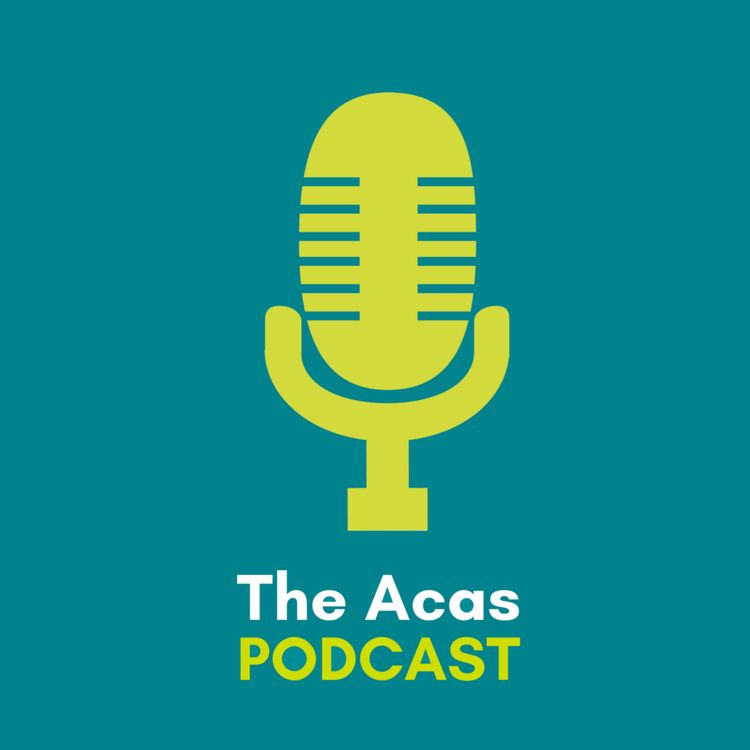Share

The Acas Podcast
Susan Clews on navigating coronavirus
In our first episode, Acas Chief Executive Susan Clews shares her key insight into what organisations can do to navigate the challenges that coronavirus presents. We look at building trust, returning to work and communicating in a crisis.
Plus: Susan shares what she has personally learnt about leadership during coronavirus.
For coronavirus workplace advice: www.acas.org.uk/coronavirus
Full Transcript available at https://shows.acast.com/acaspodcast
Transcript
Sarah Guthrie 0:00
Welcome to the Acas podcast. I'm Sarah Guthrie, part of the communications team at Acas and today I'm talking to Susan Clews, our Chief Executive, about what organizations can do to manage their people, their work, their plans in this difficult time. So Susan, I thought we'd kick off by actually just asking you what kind of issues employers and employees are coming to Acas with at the moment.
Susan Clews 0:25
All sorts of customers are coming to Acas with a whole range of issues, and they go right from employees who are interested in knowing what their rights are, whether they can get paid, if they're self isolating, or whether they are, you know, kind of quick concerns about their mental health, for example. So we're getting lots of queries to our helpline on those sorts of issues. And we're also hearing from employers too, who are particularly interested about how they keep in touch with workers during the pandemic, and particularly if they've got lots of people working from home. And then increasingly now we've got employers looking at how they can get people back to work safely. And that's a really important issue, obviously, for employees and for employers alike. We're seeing employers, I think, looking at how they can change practices in the workplace. I think it's really, really important here that they work with their employees to look at what the challenges are going to be, and how they can adapt work practices to safely accommodate people back in the office or back in the factory or shop.
Sarah Guthrie 1:35
Lots of challenging issues there through employers and employees. Thinking about Acas for a moment as an example, and the role of employers and managers as leaders of their organizations.What do you think has been the principle behind your leadership that has really helped in this situation?
Susan Clews 1:54
I think there's, in all times, it's good if you're open and honest with your people. That's something that's important to me and something I try and live in Acas. But I think during in a time like Coronavirus pandemic, where there is masses of uncertainty, and individuals might be balancing all sorts of different challenges both at home and at work, it's even more important to create a secure and clear place in the workspace so that people know what's expected of them. They know they can trust their senior leaders, and they understand that leaders have their best interests at heart. And so we've been trying to focus very clearly on those people issues, and to tell our people that they really matter to us. And we're doing that more than we've ever done before. So I think the tone of our communication has been clearer and more personal than it has been in the past. And I think that's been a good thing, actually, to really change try and get a more personal relationship with our colleagues through communicating and creating that trust with our people.
Sarah Guthrie 3:09
Really interesting. You mentioned trust there. This has been a really challenging time and I know from our helpline that trust has been a feature of this crisis - of any crisis. What advice would you give to employers or employees who feel that there's been perhaps a breakdown of trust during this time?
Susan Clews 3:35
I suppose trust is a scarce commodity isn't it and it's easily lost and can take quite a long time to rebuild. But I'd put a more positive perspective on and say if you're if you're concerned that trust has been eroded during Coronavirus, and that's perfectly understandable if it has been with all of the the challenges and demands placed upon businesses, I think it's about maybe accepting that and being a bit more open about acknowledging that maybe the relationships in the organization aren't where you want them to be. And then to take some really practical steps to rebuild trust. And that looks, to me, that looks like things like being really clear and honest in communication. It's about encouraging two way communication as well, so seeking feedback from your employees and listening to their concerns. I think it's about looking at how you collaborate with people in the business, so how you involve them in maybe planning some of the solutions for the organization and being honest about the challenges that you're facing. And I think those sorts of activities gradually rebuild trust. I don't think there's any one magic wand you can use that's going to instantly get trust back again, but I guess if you're an employee in a business what you're looking for is a really clear statement from your employer about what's important to them. You're looking for that to be backed up by their actions and their ongoing statements. And then you want to know that you're valued as an individual. I think that really helps to rebuild trust as well. So acknowledging the massive commitments and flexibility that people have shown over the last few weeks, all of those things are steps towards rebuilding trust.
Sarah Guthrie 5:32
And taking that to this issue you mentioned of how we open up workplaces and return to work. Could you perhaps give some advice on what practically that might look like for employers or managers who are thinking about the future months?
Susan Clews 5:50
Of course, businesses are keen to get back to work, but they want to do that safely. And I think there's something really important about being very clear to your employees to explain that safety is absolutely at the heart of decision making. And then employees understand that your desire to get the business back up and running again, if it's had to limit production or limit its operation, that their safety is going to be at the center of considerations as well as meeting customer needs. So I think there are some really clear messages business can come take to demonstrate to employees that their safety matters, then I think there are some actions that businesses can take to work through carefully the guidance that's been provided. So there's some government guidance on returning to work and safe working that encourages employers to talk to their employees about the challenges and the concerns they have and to seek views of employees about how best to mitigate the risks in the workplace. So involving your employees or your reps if you've got a trade union, your, your reps, workplace representatives, in that risk assessment and being clear with your people what steps you're taking to mitigate the risks, I think will help. So they're the first two steps I would take: making a really clear commitment to health and safety and individuals safety, and then to involve your employees in that process. I think there's also steps employers can take that include things like being really clear how people raise concerns, because even with the best laid plans, things don't always quite go according to plan. And so if an employee has a concern, how do they raise those issues in the workplace, and with who, and being clear that there won't be retaliation to employees if they raise queries about health and safety is important too, because it's all about trying to create that environment of safety, security and trust for employees.
Sarah Guthrie 8:01
That sounds really valuable advice, which perhaps is sometimes easier to talk about than to do. So as, could you perhaps give employers or managers who are listening to this, some maybe simple steps that they can take away today, they might be thinking, Oh, this is too much. I've got too much to think about, I can't handle this. What are the simple things that they can do that will help their organizations recover in the long run?
Susan Clews 8:32
That's a great question, Sarah, because it is daunting, isn't it, when we've had such a massive shift to remote working or no working to then think how can we safely get back to work again, so I absolutely understand those concerns. And, and as an employee and myself, I'm thinking through these things for Acas as well. I think just take it a step at a time is probably the best advice and to have a look at the government guidance on safer working and see how that applies to your business, and how you would undertake a risk assessment for your business, and then set out some really clear steps about how you go back, you could go back to work safely. I'd also look at this in a series of steps. So you don't...it's probably impossible to get straight back to working in the way you did before. So in my organization, we're thinking about how we could reopen our offices, but only for a really small number of people and keep it very small to scale to start with so that we can test out the sort of practices we're putting in place and we're looking at things like how we'd sit, how we'd arrange seating in the office so that people are still socially distance to look at things like the entrances and exit points to make sure we can get people in and out of the building safely, how we'd use lifts in a safe way to maintain distancing and to really look at all those really practical things that happen on the on a day to day basis at work and how you can plan for safety in those areas, obviously some really important issues like PPE and what equipment is necessary for your business. But I think to keep it as simple as possible, look for the really priority actions. And then what we're going to do in our organization will be to think about how do we test some of those plans, maybe with a very small number of employees coming back to work, so that we can learn real time whether those plans were right or not. And then we can change them if they're not quite right as well and learn as we go. So baby steps I think is the best way of this and being open to views feedback from your employees about what's working, and what could be done even better to create a safe working environments as well.
Sarah Guthrie 10:53
So baby steps and feedback.
Susan Clews 10:56
Baby steps and feedback will really help with this. There's no one right answer to return to work. And I think they're, they're are two principles that will help organizations get back to work.
Sarah Guthrie 11:08
Well, thank you very much, Susan, that's been fascinating for me. And for our listeners, I'm sure. Is there anything else you would like to say as a parting shot that you have learned through this crisis yourself that you would like to share?
Susan Clews 11:24
I think probably the, the biggest learning point for me during the crisis has just been to see how adaptive people can be. And if you give some elements of empowerment to individuals, and you encourage people to work up solutions, just how powerful that can be. And that is something that I've been particularly heartened by in my own organization, seeing how people have applied their skills and enthusiasm to work in new ways to meet the new challenges, and I think that's something I want to build on for the future, so we continue to capture the enthusiasm, the goodwill, the creativity of our people for the long term, as well as the crisis of Coronavirus, because I think if we can do that, that means we're just going to be a stronger and more capable organization in the future. I think the other thing I've learned, Sarah, with all of this is that it often does seem difficult. And as a leader, you feel the kind of burden and responsibility to solve everything within your organization solve all these challenging problems. But of course, I've realized that you're never alone as the leader or as a manager, and there are people there to help either within your organization or outside of that. And I think that's where Acas can come in to support a whole range of businesses really, whether it's with particular questions about what the law says, whether it's a sounding board for how the company is adapting its working practices, or to talk about issues like trust working with employees, dealing with those practical challenges of home working, or something like helping support employees with mental health. We're there to help business of any shape and size. So do ask for help if we can support you in any way.
Sarah Guthrie 13:24
Well, on that note, Susan, thank you so much for joining me today to share your advice and insight into how employees and managers can handle this really difficult time. You can find more information about Acas and the help and advice that we offer at acas.org.uk. If you have any comments or topics that you'd like us to cover next, then feel free to email acasmatters@acas.org.uk. All of those details plus more useful links will be in the session notes for this episode. Thank you for listening.
More episodes
View all episodes

How employee voice improves engagement
16:53|In the latest episode of the Acas podcast, we talk to Susan Reilly and Emma Hughes from the Phoenix Group about setting up an employee forum.They tell us why this method of hearing employee voice works for them, and how it has supported the organisation through change.The conversation also covers:How employee forum relationships differ from HR and trade unionsForum structureWhat the forum coversForum governanceHost:Terry Duffy - Strategic Lead, Growth Partnership, AcasGuests:Susan Reilly - Head of Phoenix Employee Representation ForumEmma Hughes - Communication and Engagement Consultant, Phoenix Employee Representation ForumFor more information about staff forums please visit our advice page: Using workplace forums to discuss important matters at work.
Informal conversations – the key to reducing workplace conflict?
19:42|In this episode of the Acas Podcast, Terry Duffy (Strategic Lead, Acas) sits down with Professor Richard Saundry (Principle Research Fellow, University of Westminster) to discuss the benefits of upskilling line manages and giving them the confidence to address conflict at the earliest possible stage with an informal conversation.This is a must listen for anyone with line management responsibilities, HR practitioners and anyone with an interest in good workplace relations. Further reading: Acas blog: Skilled Managers Productive Workplaces - Translating research into workplace practice that worksTraining: Conflict management skills online course
Understanding neurodiversity in the workplace
32:41|In this episode of the Acas Podcast, we’re joined by guest speakers, Professor Almuth McDowall, Professor of Organisational Psychology at Birkbeck University, and Jodie Hill, Managing Partner and founder of Thrive Law, for a deep dive discussion on neurodiversity in the workplace. The conversation covers: · What does it mean to be ‘neuro inclusive’?· What the latest research tells us· What workplaces can do to be more inclusive of neurodivergent individuals· The role of line managers· What small businesses can do· Managing conflict, and much more… Jodie will be speaking at the upcoming Acas conference - Resetting employment relations: building healthy workplaces to grow a strong economy, 15 May 2025, QEII, London. For more information: view agenda | register Presenter: · Ruhel Ahmed - Senior Policy Adviser, Acas Guidance: https://www.acas.org.uk/neurodiversity-at-work
Introducing mediation in the workplace
12:51|In this episode of the Acas Advice & Guidance podcast we talk to Angela Wright, Organisational Lead at Tees, Esk and Wear Valleys NHS Foundation about introducing mediation into the workplace. Our conversation covers the benefits and challenges of introducing mediation and will be of interest to anyone involved with conflict resolution in the workplace or people managers. For more information on how Acas can support you with workplace mediation please visit our mediation page on the Acas website. Further reading: Acas blog - Making the case for mediation.
Disability discrimination at work - why the increase?
26:41|In recent years, the number of disability discrimination claims going to employment tribunal has increased. What is causing this increase and what are the characteristics of these claims? Julie Dennis, Head of Inclusive Workplace Policy at Acas is joined by Dr Martin Mitchell, Senior Researcher at the National Centre for Social Research (NatCen) to discuss the latest research commissioned by Acas that takes a closer look at the lifecycle of a disability discrimination tribunal claims. They also discuss what organisations and people managers can do to better support colleagues with disabilities. Guidance and support: Disability at work | Flexible working Further reading: Research: Characteristics and drivers of disability discrimination claims
SMEs and mediation - what's the problem?
23:30|SMEs and mediation – what’s the problem? In the latest Acas Podcast, Emma McClean, Acas Individual Dispute Resolution Manager, talks to Martin McTague, National Chair of the Federation of Small Businesses, to discuss early, informal dispute resolution, such as mediation. They also discuss the barriers small businesses face when introducing or using mediation in the workplace and the perception of Acas impartiality. Guidance and support: Acas - For more information and guidance about mediation please visit the Acas mediation webpage. FSB - For details about the legal and HR support available from FSB as part of its membership package, visit fsb.org.uk/membership. Mediation Conference: UK Mediation Conference 2024 –25TH November 2024 | Congress Centre, London | 08:30-17:40 The UK’s leading conference bringing together Mediators, HR Professionals and Leaders. This industry-leading event will examine the conflict journey, the evidence supporting the case for a less formal approach[CR1] , including examples on what works (and what doesn’t) and partial mediation skills and techniques. To find out more visit our event page. To book your place visit our event registration page.Further reading: Making the case for mediation
Flexible working - what you need to know
09:57|Welcome to the first episode of the new Acas Advice & Guidance podcast. In this shorter format series, we will discuss the key-points of the latest employment relations issues and will sign-post to further advice, guidance, and support. In this episode we will be discussing what you need to know about flexible-working – What it is, the main changes and what you need to do. For more information visit the Acas flexible working page.
Inclusive workplaces - supporting women through menopause
32:07|Inclusive workplaces – supporting women through menopause In this episode we discuss how workplaces can better support women going through menopause. Helen Tomlinson discusses her role as the Governments first ever Menopause Employment Champion and Kate Nowicki gives her thoughts and observation from her role as Acas Menopause Champion. We’re joined by: · Helen Tomlinson – Head of Talent (UK & Ireland) for the Adecco Group and Menopause Employment Champion · Kate Nowicki – Director of Dispute Resolution for Acas. We discuss: · The role of allyship· Importance of workplace culture · Implementing a menopause policy Transcript available here: Episode resources: Further reading. Menopause at work guidance: https://www.acas.org.uk/menopause-at-work Menopause and the law: https://www.acas.org.uk/menopause-at-work/menopause-and-the-law Upcoming events:. Conference: Living and working with menopause https://obs.acas.org.uk/ViewEvent.aspx?EventId=207038 For podcast and event updates sign up to our free email newsletter.
Mental health at work: reasonable adjustments
28:47|In this episode we will explore how employers can support their staff with reasonable adjustments for mental health, creating a healthy work culture and demonstrating a commitment to good practice.We’re joined by:Jo Yarker, Managing Partner at Affinity Health at WorkJulie Denning, Managing Director of Working To Wellbeing and Chair of the Vocational Rehabilitation AssociationFrancoise Woolley, Head of Mental Health and Wellbeing at AcasWe discuss:what reasonable adjustments for mental health arewhat the law sayssupporting health and wellbeingTranscript available at www.acas.org.uk/podcast/mental-health-at-work-reasonable-adjustmentsEpisode resources:Find out more about reasonable adjustments for mental health at workYou can also:read research and case studies about reasonable adjustments for mental healthfind training on mental health in the workplace Use our templates for:making a mental health reasonable adjustment requestconfirming mental health reasonable adjustmentsreviewing and monitoring reasonable adjustments for mental healthNICE guideline: Mental wellbeing at workFor podcast and event updates sign up to our free email newsletter